Critical Evaluation: Speeches in McPhail v Doulton & Boardman v Phipps
VerifiedAdded on 2023/06/11
|9
|2189
|242
Essay
AI Summary
This essay provides a critical evaluation of the speeches delivered by Lord Wilberforce in McPhail v Doulton and by Lord Cohen and Lord Upjohn in Boardman v Phipps, examining the extent to which these speeches clarified the relevant law. The analysis of McPhail v Doulton focuses on the establishment of a fund for staff benefit and the validity of the trust deed, while the evaluation of Boardman v Phipps centers on fiduciary duties and potential conflicts of interest arising from information gained through agency relationships. The essay reviews the judges' opinions, particularly concerning the nature of information as property and the implications for trustees. The conclusion reflects on the legal principles and their practical application, considering whether the speeches provided substantive clarity or introduced further complexities.
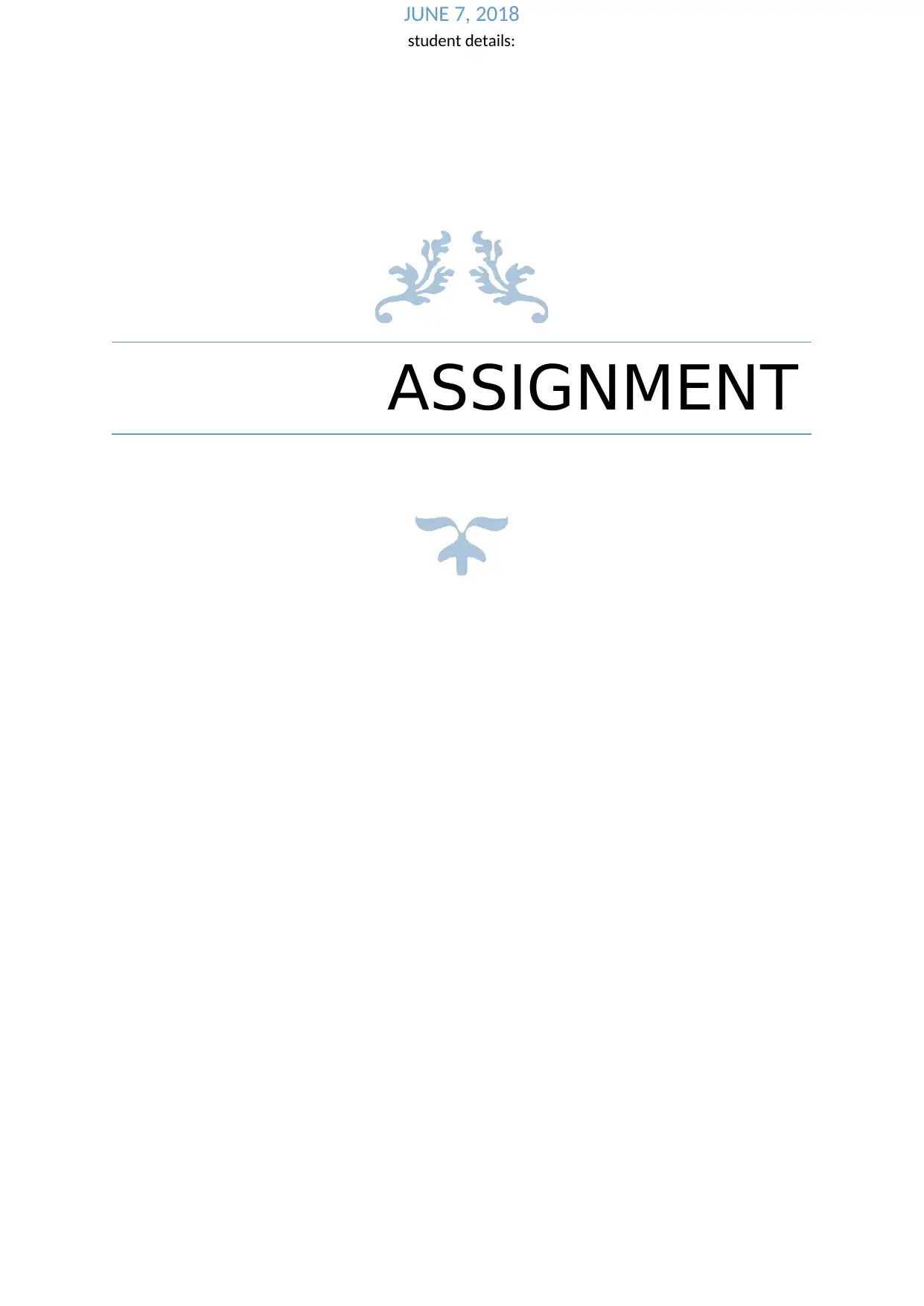
ASSIGNMENT
JUNE 7, 2018
student details:
JUNE 7, 2018
student details:
Paraphrase This Document
Need a fresh take? Get an instant paraphrase of this document with our AI Paraphraser
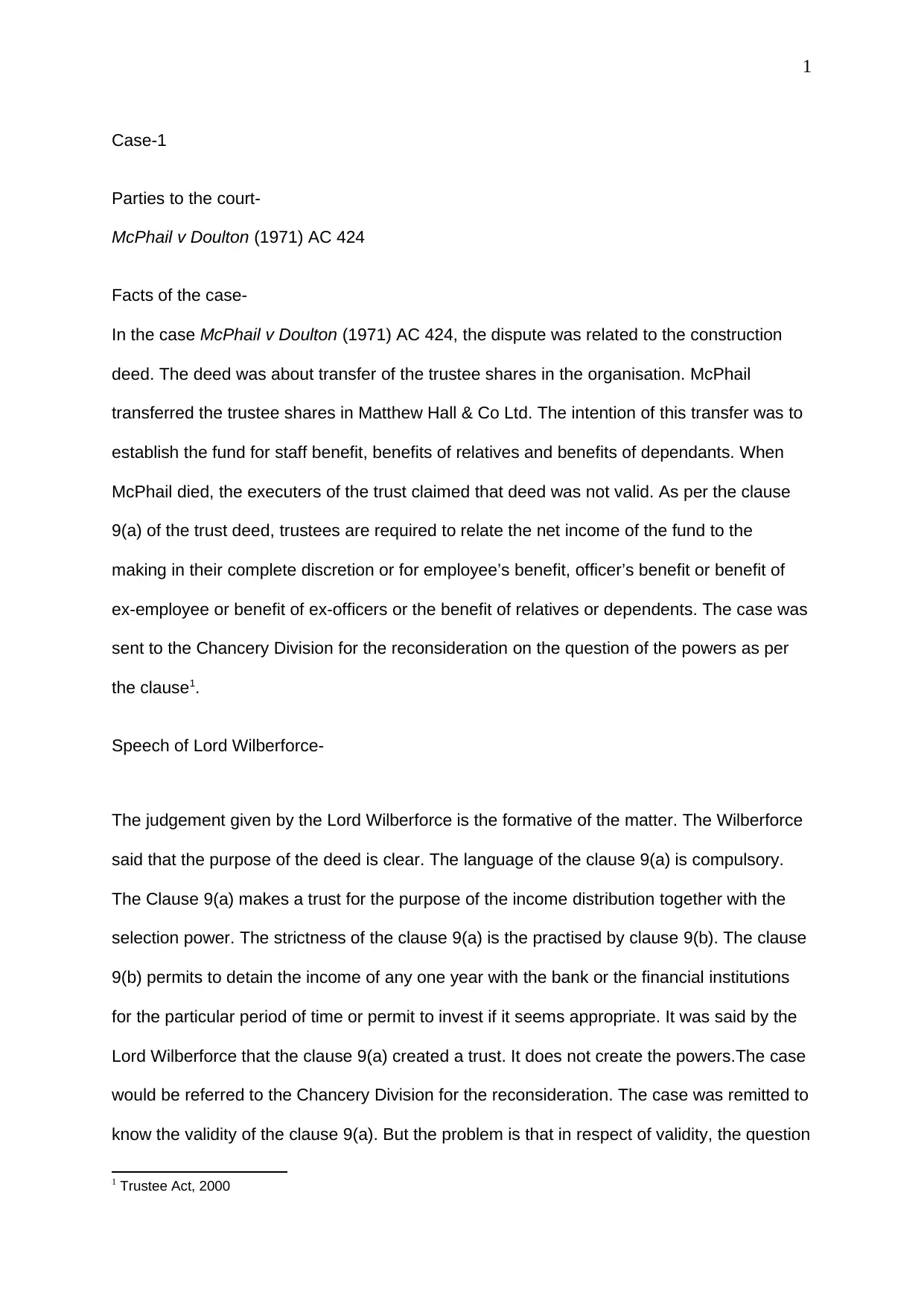
1
Case-1
Parties to the court-
McPhail v Doulton (1971) AC 424
Facts of the case-
In the case McPhail v Doulton (1971) AC 424, the dispute was related to the construction
deed. The deed was about transfer of the trustee shares in the organisation. McPhail
transferred the trustee shares in Matthew Hall & Co Ltd. The intention of this transfer was to
establish the fund for staff benefit, benefits of relatives and benefits of dependants. When
McPhail died, the executers of the trust claimed that deed was not valid. As per the clause
9(a) of the trust deed, trustees are required to relate the net income of the fund to the
making in their complete discretion or for employee’s benefit, officer’s benefit or benefit of
ex-employee or benefit of ex-officers or the benefit of relatives or dependents. The case was
sent to the Chancery Division for the reconsideration on the question of the powers as per
the clause1.
Speech of Lord Wilberforce-
The judgement given by the Lord Wilberforce is the formative of the matter. The Wilberforce
said that the purpose of the deed is clear. The language of the clause 9(a) is compulsory.
The Clause 9(a) makes a trust for the purpose of the income distribution together with the
selection power. The strictness of the clause 9(a) is the practised by clause 9(b). The clause
9(b) permits to detain the income of any one year with the bank or the financial institutions
for the particular period of time or permit to invest if it seems appropriate. It was said by the
Lord Wilberforce that the clause 9(a) created a trust. It does not create the powers.The case
would be referred to the Chancery Division for the reconsideration. The case was remitted to
know the validity of the clause 9(a). But the problem is that in respect of validity, the question
1 Trustee Act, 2000
Case-1
Parties to the court-
McPhail v Doulton (1971) AC 424
Facts of the case-
In the case McPhail v Doulton (1971) AC 424, the dispute was related to the construction
deed. The deed was about transfer of the trustee shares in the organisation. McPhail
transferred the trustee shares in Matthew Hall & Co Ltd. The intention of this transfer was to
establish the fund for staff benefit, benefits of relatives and benefits of dependants. When
McPhail died, the executers of the trust claimed that deed was not valid. As per the clause
9(a) of the trust deed, trustees are required to relate the net income of the fund to the
making in their complete discretion or for employee’s benefit, officer’s benefit or benefit of
ex-employee or benefit of ex-officers or the benefit of relatives or dependents. The case was
sent to the Chancery Division for the reconsideration on the question of the powers as per
the clause1.
Speech of Lord Wilberforce-
The judgement given by the Lord Wilberforce is the formative of the matter. The Wilberforce
said that the purpose of the deed is clear. The language of the clause 9(a) is compulsory.
The Clause 9(a) makes a trust for the purpose of the income distribution together with the
selection power. The strictness of the clause 9(a) is the practised by clause 9(b). The clause
9(b) permits to detain the income of any one year with the bank or the financial institutions
for the particular period of time or permit to invest if it seems appropriate. It was said by the
Lord Wilberforce that the clause 9(a) created a trust. It does not create the powers.The case
would be referred to the Chancery Division for the reconsideration. The case was remitted to
know the validity of the clause 9(a). But the problem is that in respect of validity, the question
1 Trustee Act, 2000
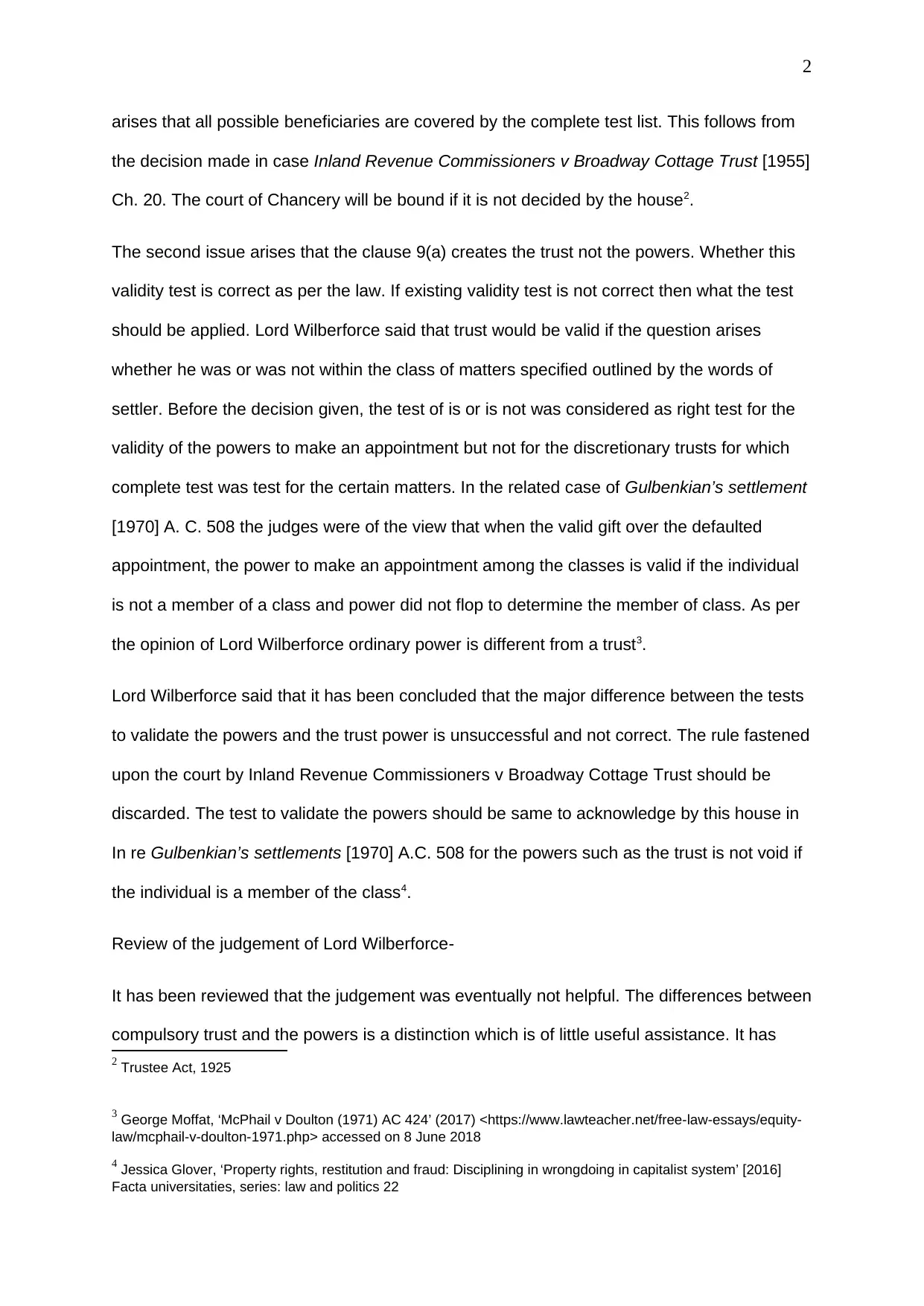
2
arises that all possible beneficiaries are covered by the complete test list. This follows from
the decision made in case Inland Revenue Commissioners v Broadway Cottage Trust [1955]
Ch. 20. The court of Chancery will be bound if it is not decided by the house2.
The second issue arises that the clause 9(a) creates the trust not the powers. Whether this
validity test is correct as per the law. If existing validity test is not correct then what the test
should be applied. Lord Wilberforce said that trust would be valid if the question arises
whether he was or was not within the class of matters specified outlined by the words of
settler. Before the decision given, the test of is or is not was considered as right test for the
validity of the powers to make an appointment but not for the discretionary trusts for which
complete test was test for the certain matters. In the related case of Gulbenkian’s settlement
[1970] A. C. 508 the judges were of the view that when the valid gift over the defaulted
appointment, the power to make an appointment among the classes is valid if the individual
is not a member of a class and power did not flop to determine the member of class. As per
the opinion of Lord Wilberforce ordinary power is different from a trust3.
Lord Wilberforce said that it has been concluded that the major difference between the tests
to validate the powers and the trust power is unsuccessful and not correct. The rule fastened
upon the court by Inland Revenue Commissioners v Broadway Cottage Trust should be
discarded. The test to validate the powers should be same to acknowledge by this house in
In re Gulbenkian’s settlements [1970] A.C. 508 for the powers such as the trust is not void if
the individual is a member of the class4.
Review of the judgement of Lord Wilberforce-
It has been reviewed that the judgement was eventually not helpful. The differences between
compulsory trust and the powers is a distinction which is of little useful assistance. It has
2 Trustee Act, 1925
3 George Moffat, ‘McPhail v Doulton (1971) AC 424’ (2017) <https://www.lawteacher.net/free-law-essays/equity-
law/mcphail-v-doulton-1971.php> accessed on 8 June 2018
4 Jessica Glover, ‘Property rights, restitution and fraud: Disciplining in wrongdoing in capitalist system’ [2016]
Facta universitaties, series: law and politics 22
arises that all possible beneficiaries are covered by the complete test list. This follows from
the decision made in case Inland Revenue Commissioners v Broadway Cottage Trust [1955]
Ch. 20. The court of Chancery will be bound if it is not decided by the house2.
The second issue arises that the clause 9(a) creates the trust not the powers. Whether this
validity test is correct as per the law. If existing validity test is not correct then what the test
should be applied. Lord Wilberforce said that trust would be valid if the question arises
whether he was or was not within the class of matters specified outlined by the words of
settler. Before the decision given, the test of is or is not was considered as right test for the
validity of the powers to make an appointment but not for the discretionary trusts for which
complete test was test for the certain matters. In the related case of Gulbenkian’s settlement
[1970] A. C. 508 the judges were of the view that when the valid gift over the defaulted
appointment, the power to make an appointment among the classes is valid if the individual
is not a member of a class and power did not flop to determine the member of class. As per
the opinion of Lord Wilberforce ordinary power is different from a trust3.
Lord Wilberforce said that it has been concluded that the major difference between the tests
to validate the powers and the trust power is unsuccessful and not correct. The rule fastened
upon the court by Inland Revenue Commissioners v Broadway Cottage Trust should be
discarded. The test to validate the powers should be same to acknowledge by this house in
In re Gulbenkian’s settlements [1970] A.C. 508 for the powers such as the trust is not void if
the individual is a member of the class4.
Review of the judgement of Lord Wilberforce-
It has been reviewed that the judgement was eventually not helpful. The differences between
compulsory trust and the powers is a distinction which is of little useful assistance. It has
2 Trustee Act, 1925
3 George Moffat, ‘McPhail v Doulton (1971) AC 424’ (2017) <https://www.lawteacher.net/free-law-essays/equity-
law/mcphail-v-doulton-1971.php> accessed on 8 June 2018
4 Jessica Glover, ‘Property rights, restitution and fraud: Disciplining in wrongdoing in capitalist system’ [2016]
Facta universitaties, series: law and politics 22
⊘ This is a preview!⊘
Do you want full access?
Subscribe today to unlock all pages.

Trusted by 1+ million students worldwide
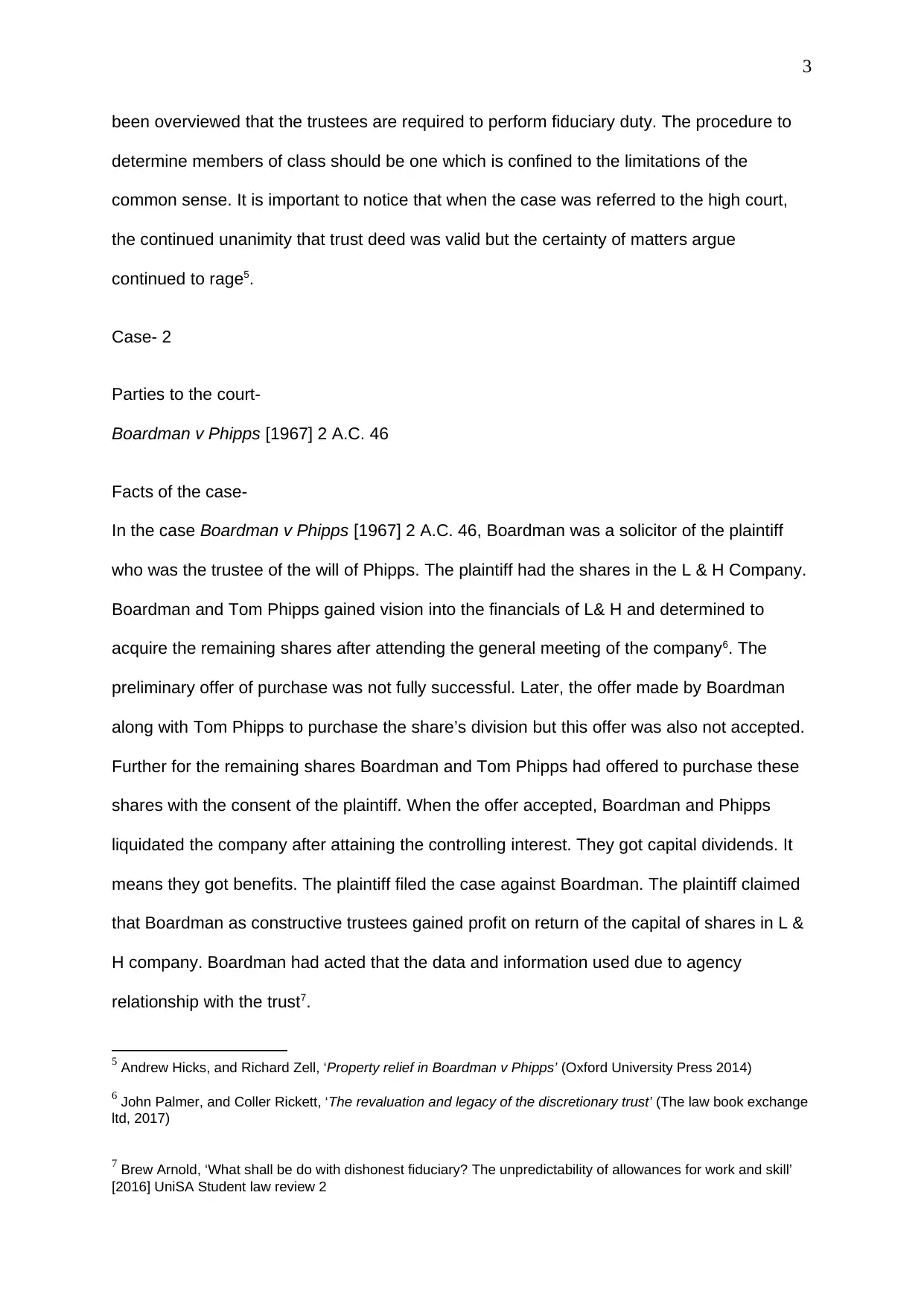
3
been overviewed that the trustees are required to perform fiduciary duty. The procedure to
determine members of class should be one which is confined to the limitations of the
common sense. It is important to notice that when the case was referred to the high court,
the continued unanimity that trust deed was valid but the certainty of matters argue
continued to rage5.
Case- 2
Parties to the court-
Boardman v Phipps [1967] 2 A.C. 46
Facts of the case-
In the case Boardman v Phipps [1967] 2 A.C. 46, Boardman was a solicitor of the plaintiff
who was the trustee of the will of Phipps. The plaintiff had the shares in the L & H Company.
Boardman and Tom Phipps gained vision into the financials of L& H and determined to
acquire the remaining shares after attending the general meeting of the company6. The
preliminary offer of purchase was not fully successful. Later, the offer made by Boardman
along with Tom Phipps to purchase the share’s division but this offer was also not accepted.
Further for the remaining shares Boardman and Tom Phipps had offered to purchase these
shares with the consent of the plaintiff. When the offer accepted, Boardman and Phipps
liquidated the company after attaining the controlling interest. They got capital dividends. It
means they got benefits. The plaintiff filed the case against Boardman. The plaintiff claimed
that Boardman as constructive trustees gained profit on return of the capital of shares in L &
H company. Boardman had acted that the data and information used due to agency
relationship with the trust7.
5 Andrew Hicks, and Richard Zell, ‘Property relief in Boardman v Phipps’ (Oxford University Press 2014)
6 John Palmer, and Coller Rickett, ‘The revaluation and legacy of the discretionary trust’ (The law book exchange
ltd, 2017)
7 Brew Arnold, ‘What shall be do with dishonest fiduciary? The unpredictability of allowances for work and skill’
[2016] UniSA Student law review 2
been overviewed that the trustees are required to perform fiduciary duty. The procedure to
determine members of class should be one which is confined to the limitations of the
common sense. It is important to notice that when the case was referred to the high court,
the continued unanimity that trust deed was valid but the certainty of matters argue
continued to rage5.
Case- 2
Parties to the court-
Boardman v Phipps [1967] 2 A.C. 46
Facts of the case-
In the case Boardman v Phipps [1967] 2 A.C. 46, Boardman was a solicitor of the plaintiff
who was the trustee of the will of Phipps. The plaintiff had the shares in the L & H Company.
Boardman and Tom Phipps gained vision into the financials of L& H and determined to
acquire the remaining shares after attending the general meeting of the company6. The
preliminary offer of purchase was not fully successful. Later, the offer made by Boardman
along with Tom Phipps to purchase the share’s division but this offer was also not accepted.
Further for the remaining shares Boardman and Tom Phipps had offered to purchase these
shares with the consent of the plaintiff. When the offer accepted, Boardman and Phipps
liquidated the company after attaining the controlling interest. They got capital dividends. It
means they got benefits. The plaintiff filed the case against Boardman. The plaintiff claimed
that Boardman as constructive trustees gained profit on return of the capital of shares in L &
H company. Boardman had acted that the data and information used due to agency
relationship with the trust7.
5 Andrew Hicks, and Richard Zell, ‘Property relief in Boardman v Phipps’ (Oxford University Press 2014)
6 John Palmer, and Coller Rickett, ‘The revaluation and legacy of the discretionary trust’ (The law book exchange
ltd, 2017)
7 Brew Arnold, ‘What shall be do with dishonest fiduciary? The unpredictability of allowances for work and skill’
[2016] UniSA Student law review 2
Paraphrase This Document
Need a fresh take? Get an instant paraphrase of this document with our AI Paraphraser
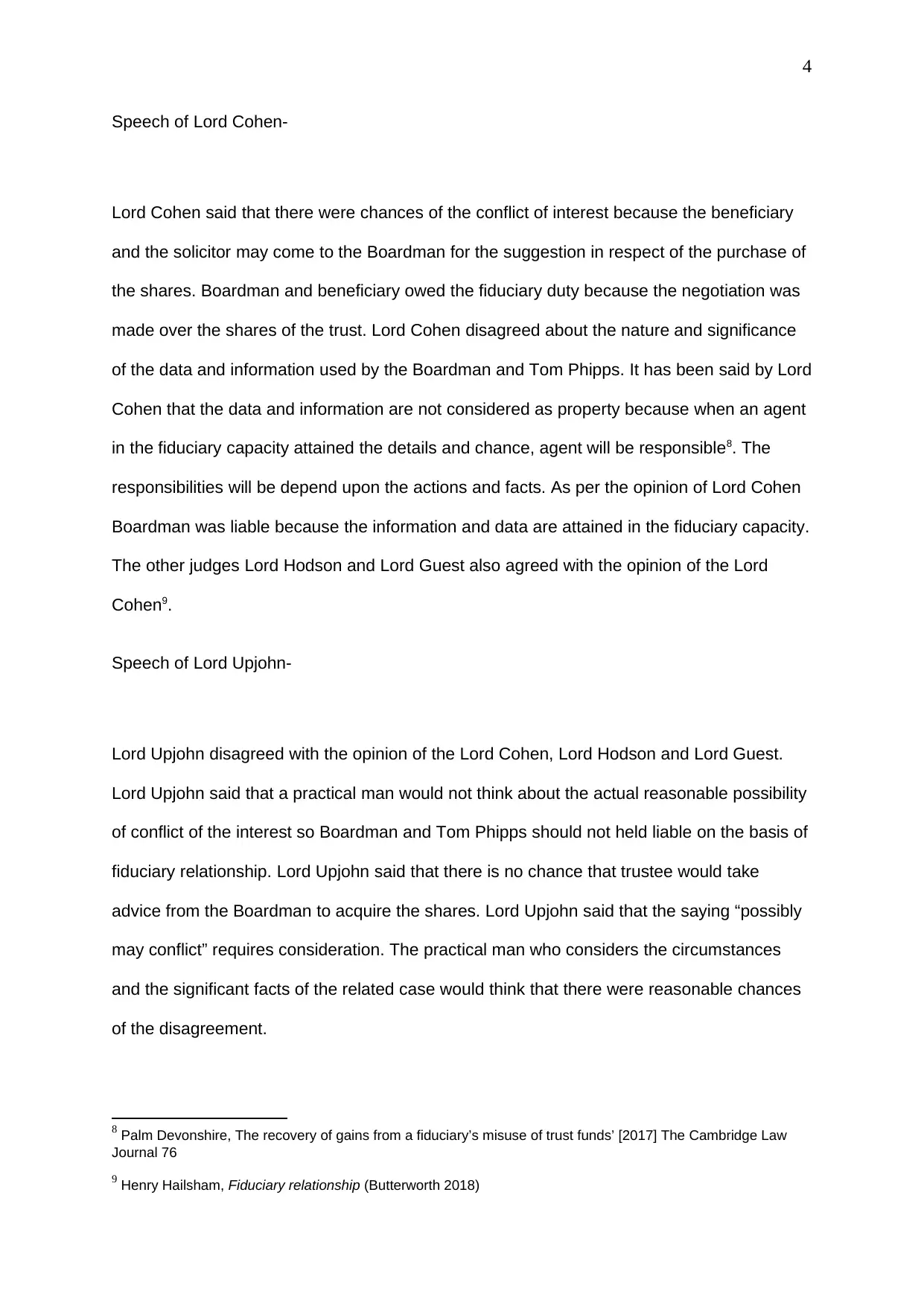
4
Speech of Lord Cohen-
Lord Cohen said that there were chances of the conflict of interest because the beneficiary
and the solicitor may come to the Boardman for the suggestion in respect of the purchase of
the shares. Boardman and beneficiary owed the fiduciary duty because the negotiation was
made over the shares of the trust. Lord Cohen disagreed about the nature and significance
of the data and information used by the Boardman and Tom Phipps. It has been said by Lord
Cohen that the data and information are not considered as property because when an agent
in the fiduciary capacity attained the details and chance, agent will be responsible8. The
responsibilities will be depend upon the actions and facts. As per the opinion of Lord Cohen
Boardman was liable because the information and data are attained in the fiduciary capacity.
The other judges Lord Hodson and Lord Guest also agreed with the opinion of the Lord
Cohen9.
Speech of Lord Upjohn-
Lord Upjohn disagreed with the opinion of the Lord Cohen, Lord Hodson and Lord Guest.
Lord Upjohn said that a practical man would not think about the actual reasonable possibility
of conflict of the interest so Boardman and Tom Phipps should not held liable on the basis of
fiduciary relationship. Lord Upjohn said that there is no chance that trustee would take
advice from the Boardman to acquire the shares. Lord Upjohn said that the saying “possibly
may conflict” requires consideration. The practical man who considers the circumstances
and the significant facts of the related case would think that there were reasonable chances
of the disagreement.
8 Palm Devonshire, The recovery of gains from a fiduciary’s misuse of trust funds’ [2017] The Cambridge Law
Journal 76
9 Henry Hailsham, Fiduciary relationship (Butterworth 2018)
Speech of Lord Cohen-
Lord Cohen said that there were chances of the conflict of interest because the beneficiary
and the solicitor may come to the Boardman for the suggestion in respect of the purchase of
the shares. Boardman and beneficiary owed the fiduciary duty because the negotiation was
made over the shares of the trust. Lord Cohen disagreed about the nature and significance
of the data and information used by the Boardman and Tom Phipps. It has been said by Lord
Cohen that the data and information are not considered as property because when an agent
in the fiduciary capacity attained the details and chance, agent will be responsible8. The
responsibilities will be depend upon the actions and facts. As per the opinion of Lord Cohen
Boardman was liable because the information and data are attained in the fiduciary capacity.
The other judges Lord Hodson and Lord Guest also agreed with the opinion of the Lord
Cohen9.
Speech of Lord Upjohn-
Lord Upjohn disagreed with the opinion of the Lord Cohen, Lord Hodson and Lord Guest.
Lord Upjohn said that a practical man would not think about the actual reasonable possibility
of conflict of the interest so Boardman and Tom Phipps should not held liable on the basis of
fiduciary relationship. Lord Upjohn said that there is no chance that trustee would take
advice from the Boardman to acquire the shares. Lord Upjohn said that the saying “possibly
may conflict” requires consideration. The practical man who considers the circumstances
and the significant facts of the related case would think that there were reasonable chances
of the disagreement.
8 Palm Devonshire, The recovery of gains from a fiduciary’s misuse of trust funds’ [2017] The Cambridge Law
Journal 76
9 Henry Hailsham, Fiduciary relationship (Butterworth 2018)
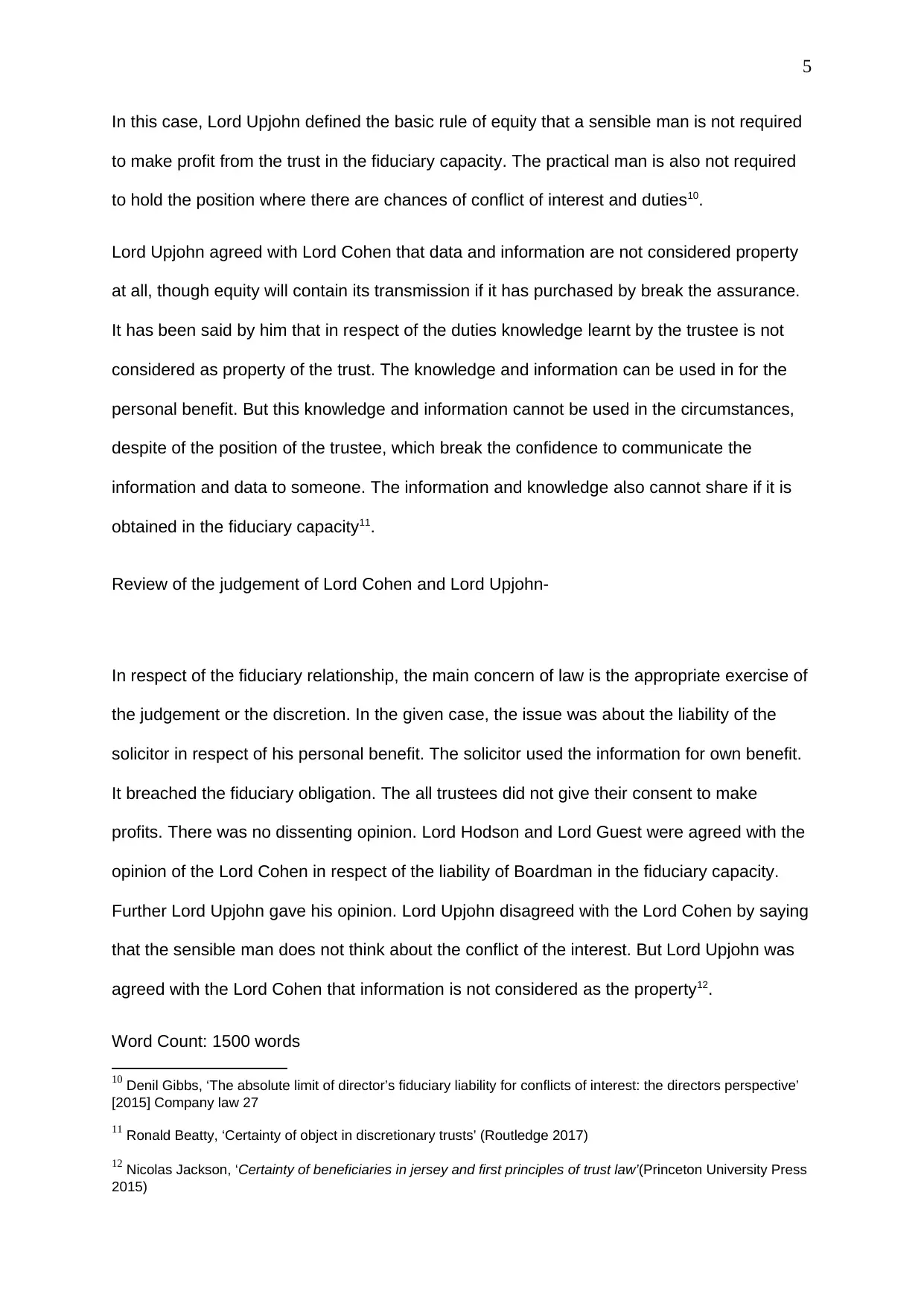
5
In this case, Lord Upjohn defined the basic rule of equity that a sensible man is not required
to make profit from the trust in the fiduciary capacity. The practical man is also not required
to hold the position where there are chances of conflict of interest and duties10.
Lord Upjohn agreed with Lord Cohen that data and information are not considered property
at all, though equity will contain its transmission if it has purchased by break the assurance.
It has been said by him that in respect of the duties knowledge learnt by the trustee is not
considered as property of the trust. The knowledge and information can be used in for the
personal benefit. But this knowledge and information cannot be used in the circumstances,
despite of the position of the trustee, which break the confidence to communicate the
information and data to someone. The information and knowledge also cannot share if it is
obtained in the fiduciary capacity11.
Review of the judgement of Lord Cohen and Lord Upjohn-
In respect of the fiduciary relationship, the main concern of law is the appropriate exercise of
the judgement or the discretion. In the given case, the issue was about the liability of the
solicitor in respect of his personal benefit. The solicitor used the information for own benefit.
It breached the fiduciary obligation. The all trustees did not give their consent to make
profits. There was no dissenting opinion. Lord Hodson and Lord Guest were agreed with the
opinion of the Lord Cohen in respect of the liability of Boardman in the fiduciary capacity.
Further Lord Upjohn gave his opinion. Lord Upjohn disagreed with the Lord Cohen by saying
that the sensible man does not think about the conflict of the interest. But Lord Upjohn was
agreed with the Lord Cohen that information is not considered as the property12.
Word Count: 1500 words
10 Denil Gibbs, ‘The absolute limit of director’s fiduciary liability for conflicts of interest: the directors perspective’
[2015] Company law 27
11 Ronald Beatty, ‘Certainty of object in discretionary trusts’ (Routledge 2017)
12 Nicolas Jackson, ‘Certainty of beneficiaries in jersey and first principles of trust law’(Princeton University Press
2015)
In this case, Lord Upjohn defined the basic rule of equity that a sensible man is not required
to make profit from the trust in the fiduciary capacity. The practical man is also not required
to hold the position where there are chances of conflict of interest and duties10.
Lord Upjohn agreed with Lord Cohen that data and information are not considered property
at all, though equity will contain its transmission if it has purchased by break the assurance.
It has been said by him that in respect of the duties knowledge learnt by the trustee is not
considered as property of the trust. The knowledge and information can be used in for the
personal benefit. But this knowledge and information cannot be used in the circumstances,
despite of the position of the trustee, which break the confidence to communicate the
information and data to someone. The information and knowledge also cannot share if it is
obtained in the fiduciary capacity11.
Review of the judgement of Lord Cohen and Lord Upjohn-
In respect of the fiduciary relationship, the main concern of law is the appropriate exercise of
the judgement or the discretion. In the given case, the issue was about the liability of the
solicitor in respect of his personal benefit. The solicitor used the information for own benefit.
It breached the fiduciary obligation. The all trustees did not give their consent to make
profits. There was no dissenting opinion. Lord Hodson and Lord Guest were agreed with the
opinion of the Lord Cohen in respect of the liability of Boardman in the fiduciary capacity.
Further Lord Upjohn gave his opinion. Lord Upjohn disagreed with the Lord Cohen by saying
that the sensible man does not think about the conflict of the interest. But Lord Upjohn was
agreed with the Lord Cohen that information is not considered as the property12.
Word Count: 1500 words
10 Denil Gibbs, ‘The absolute limit of director’s fiduciary liability for conflicts of interest: the directors perspective’
[2015] Company law 27
11 Ronald Beatty, ‘Certainty of object in discretionary trusts’ (Routledge 2017)
12 Nicolas Jackson, ‘Certainty of beneficiaries in jersey and first principles of trust law’(Princeton University Press
2015)
⊘ This is a preview!⊘
Do you want full access?
Subscribe today to unlock all pages.

Trusted by 1+ million students worldwide

6
Paraphrase This Document
Need a fresh take? Get an instant paraphrase of this document with our AI Paraphraser
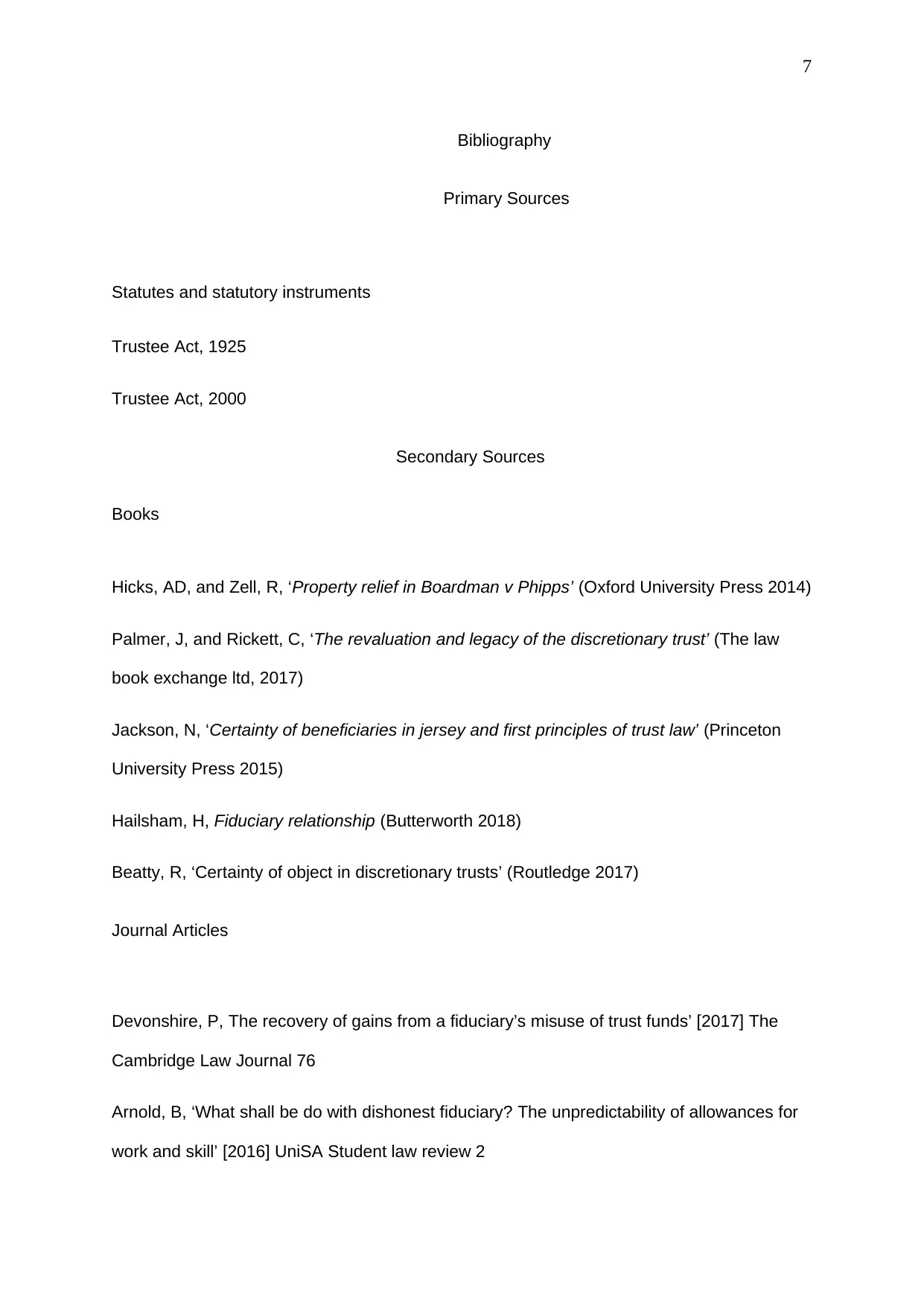
7
Bibliography
Primary Sources
Statutes and statutory instruments
Trustee Act, 1925
Trustee Act, 2000
Secondary Sources
Books
Hicks, AD, and Zell, R, ‘Property relief in Boardman v Phipps’ (Oxford University Press 2014)
Palmer, J, and Rickett, C, ‘The revaluation and legacy of the discretionary trust’ (The law
book exchange ltd, 2017)
Jackson, N, ‘Certainty of beneficiaries in jersey and first principles of trust law’ (Princeton
University Press 2015)
Hailsham, H, Fiduciary relationship (Butterworth 2018)
Beatty, R, ‘Certainty of object in discretionary trusts’ (Routledge 2017)
Journal Articles
Devonshire, P, The recovery of gains from a fiduciary’s misuse of trust funds’ [2017] The
Cambridge Law Journal 76
Arnold, B, ‘What shall be do with dishonest fiduciary? The unpredictability of allowances for
work and skill’ [2016] UniSA Student law review 2
Bibliography
Primary Sources
Statutes and statutory instruments
Trustee Act, 1925
Trustee Act, 2000
Secondary Sources
Books
Hicks, AD, and Zell, R, ‘Property relief in Boardman v Phipps’ (Oxford University Press 2014)
Palmer, J, and Rickett, C, ‘The revaluation and legacy of the discretionary trust’ (The law
book exchange ltd, 2017)
Jackson, N, ‘Certainty of beneficiaries in jersey and first principles of trust law’ (Princeton
University Press 2015)
Hailsham, H, Fiduciary relationship (Butterworth 2018)
Beatty, R, ‘Certainty of object in discretionary trusts’ (Routledge 2017)
Journal Articles
Devonshire, P, The recovery of gains from a fiduciary’s misuse of trust funds’ [2017] The
Cambridge Law Journal 76
Arnold, B, ‘What shall be do with dishonest fiduciary? The unpredictability of allowances for
work and skill’ [2016] UniSA Student law review 2
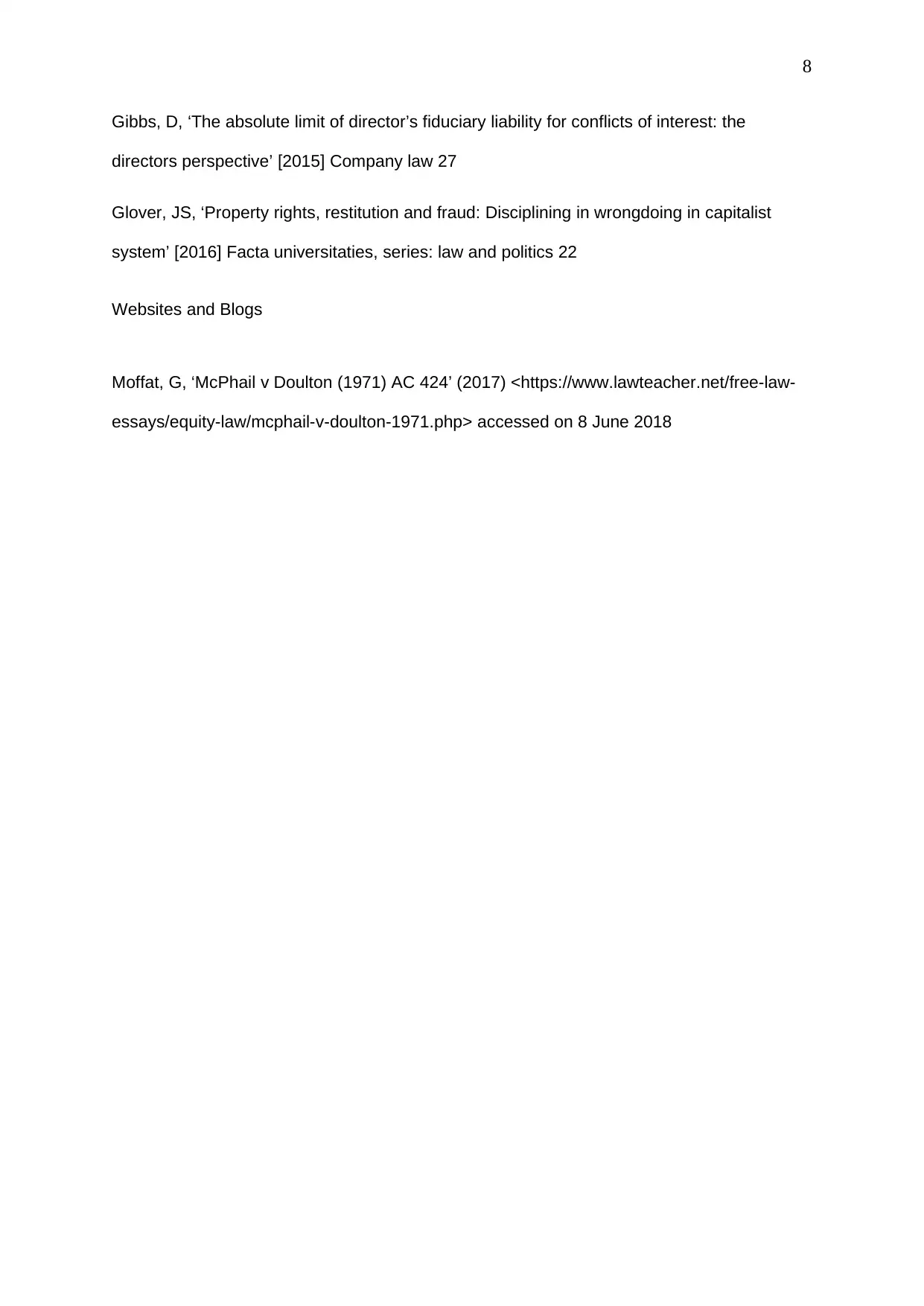
8
Gibbs, D, ‘The absolute limit of director’s fiduciary liability for conflicts of interest: the
directors perspective’ [2015] Company law 27
Glover, JS, ‘Property rights, restitution and fraud: Disciplining in wrongdoing in capitalist
system’ [2016] Facta universitaties, series: law and politics 22
Websites and Blogs
Moffat, G, ‘McPhail v Doulton (1971) AC 424’ (2017) <https://www.lawteacher.net/free-law-
essays/equity-law/mcphail-v-doulton-1971.php> accessed on 8 June 2018
Gibbs, D, ‘The absolute limit of director’s fiduciary liability for conflicts of interest: the
directors perspective’ [2015] Company law 27
Glover, JS, ‘Property rights, restitution and fraud: Disciplining in wrongdoing in capitalist
system’ [2016] Facta universitaties, series: law and politics 22
Websites and Blogs
Moffat, G, ‘McPhail v Doulton (1971) AC 424’ (2017) <https://www.lawteacher.net/free-law-
essays/equity-law/mcphail-v-doulton-1971.php> accessed on 8 June 2018
⊘ This is a preview!⊘
Do you want full access?
Subscribe today to unlock all pages.

Trusted by 1+ million students worldwide
1 out of 9
Your All-in-One AI-Powered Toolkit for Academic Success.
+13062052269
info@desklib.com
Available 24*7 on WhatsApp / Email
![[object Object]](/_next/static/media/star-bottom.7253800d.svg)
Unlock your academic potential
Copyright © 2020–2026 A2Z Services. All Rights Reserved. Developed and managed by ZUCOL.
